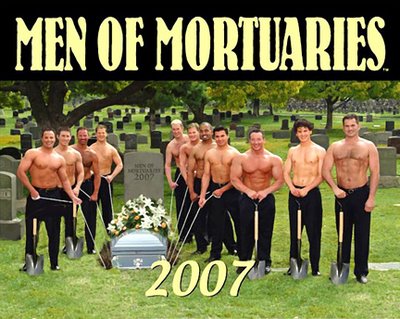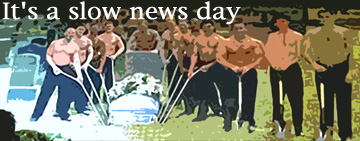

▼▲ BACK IN THE 60s, I was a Boy Scout, a member of Troop 850 in Villa Park. Later, my dad and I started a troop in the Anaheim Hills (Troop 536, sponsored by Trinity Lutheran Church).
In those days, attitudes were different of course. Scoutmasters routinely led kids in rituals of simple-minded “love it or leave it” patriotism. My troop admired the local Marines. (I
still admire them pretty much as I did then.) But I don’t recall any Scout leader ever supporting or even
mentioning the war. The war was viewed as too political, too much a matter of personal opinion (among parents—kids didn't talk much about the war).
And I don’t recall an emphasis on religion. For us Scouts, religion came up as an annoying break in the fun on Sunday mornings on campouts. For an hour, Protestants would go off to do their thing and Catholics would go off to do theirs. (Other groups were accommodated whenever possible.) Mostly, though, religion was viewed as each Scout’s private business. And if a kid was a non-believer, an effort was usually made to keep him out of the crosshairs of bigotry.
I do not recall homosexuality being addressed in any way. Admittedly, Boy Scout leaders viewed male homosexuality as most people did in those days. But there was no explicit policy about it or against it. No one ever talked about it.
● WELL, AS YOU KNOW, that changed. Much later, the Boy Scouts of America (BSA) embraced an explicit policy of exclusion of atheists and, especially, gays. Back in 2002, the BSA adopted a
Resolution according to which
…homosexual conduct is inconsistent with the traditional values espoused in the Scout Oath and Law and … an avowed homosexual cannot serve as a role model for the values of the Oath and Law
I appreciate the problem for BSA posed by Scout leaders who are “avowed homosexuals” (although there’s avowed and then there’s
avowed). It isn’t always good to force an issue as some gay Scout leaders evidently did. Sometimes, that sort of thing makes matters worse.
But why did the BSA have to embrace the notion that “homosexual conduct” is contrary to Scout values? Why go there?
So the BSA went where it went, and that involved the BSA self-identifying as a kind of private religious organization that excludes certain people.
● A RELIGIOUS ORGANIZATION? Well, the BSA may want to find the guy who counsels Scouts on their “Litigation” merit badges, ‘cause the California Supreme Court will soon consider whether the BSA are ineligible for receiving state aid, seeing as how they’re some kind of
religious organization! Here are excerpts from this morning’s San Francisco Chronicle (
High court may take up question of Scouts' religious status):
Six years ago, the Boy Scouts convinced the U.S. Supreme Court that their deep-seated principles gave them a constitutional right to exclude gays and atheists. Now the California Supreme Court has been asked to look at the other side of that coin—whether the Scouts are a religious organization ineligible for certain types of government aid….
U.S. District Judge Napoleon Jones ruled in 2003 that the Scouts—who require members and leaders to believe in God, and who have numerous faith-based programs—are a "religious organization with a religious purpose and a faith-based mission.'' He said the city's preferential treatment, granting a no-bid lease [of property, in San Diego] to the Scouts for a nominal fee, was therefore unconstitutional.
The federal appeals panel wants the state Supreme Court to decide whether the lease violates the state Constitution's strict bans on government aid and preferences for religious institutions….
The ACLU is involved. It doesn’t look good for the BSA.
● ACCORDING TO JUBAL at the conservative
OC Blog, the “The Orange County United Way has cut all funding to the Orange County Council [OC Boy Scouts] from 2006-2009.” That factoid yesterday inspired the OC Register’s
Steven Greenhut to opine: “The [OC United Way] has given some excuse for no longer funding the scouts, but the Boy Scouts have been long under attack for not accepting gays.”
Greenhut could be right about the United Way’s true motives, I suppose.

● "FORGET THAT ORDER." This stuff reminds me of a story told by former WAC Johnnie Phelps.
(Note: since I first wrote this post, I have become aware that some knowledgeable, if partisan, individuals assert that Phelps' account is fabricated or the result of delusion. See, for instance, the research of Lois Beck, Pat Jernigan, Margaret Salm.)
Phelps claimed to have an encounter with General Dwight Eisenhower (when, according to her, she served on his staff during the postwar occupation of Europe) in which Ike saw the wisdom in not forcing the "lesbian" issue. Here’s Randy Shilt’s
account (see page 107) of that conversation:
…Phelps admired Eisenhower as a soldier’s soldier who genuinely cared for his troops and would never order them to do something he would not do himself. Out of respect for Eisenhower, Phelps would never have lied to him, which was why she knew how to answer the day he called her into his office and said he had heard reports that there were lesbians in the WAC battalion. He wanted a list of their names, he said, so he could get rid of them. That, Phelps suspected, would be a tall order, since she estimated 95 percent of the WAC battalion … was lesbian.
“Yes, sir,” Phelps said to the general, according to her later account. She would make the list, if that was the order. Then she reminded Eisenhower that the WAC battalion at his headquarters was one of the most decorated in the Army. It performed superbly, had the fewest unauthorized absences, the least number of venereal-disease cases, and the most infrequent number of pregnancies of any WAC group anywhere. Getting rid of the lesbians would mean losing competent file clerks, typists, and a large share of the headquarters’ key personnel. “I’ll make your list,” Phelps concluded in her crackling North Carolina accent, “but you’ve got to know that when you get the list back, my name’s going to be first.”
Eisenhower’s secretary, also in the room, corrected the sergeant. “Sir,” the secretary said, “if the General pleases, Sergeant Phelps will have to be second on the list. I’m going to type it. My name will be first.”
According to Phelps, Eisenhower looked at her, looked at the secretary, shook his head, and said, “Forget that order. Forget about it.”
(For a discussion of the factual refutation of Phelps' story, see comments below.)
▼▲ This morning, I read about some undertakers making a beefcake calendar for charity:
R.I.P. the shirt!. See the pic (Men of Mortuaries) above. I put it up there to catch your eye. I can be tricky like that.
Um, plus it’s a slow news day.


 My mom makes lots of clay pots and whatnot. Here's one she made a while back:
My mom makes lots of clay pots and whatnot. Here's one she made a while back: Actually, I kinda messed up the photograph, so it looks darker than it really is. But I like it.
Actually, I kinda messed up the photograph, so it looks darker than it really is. But I like it. A friend of mine finds his way to my folks' workshop as often as he can just on the chance that my mom'll offer him one of her pots.
A friend of mine finds his way to my folks' workshop as often as he can just on the chance that my mom'll offer him one of her pots.  Actually, I've got lots more of these things, but I don't want to over-do it. There are literally hundreds of pots and jars and paintings and sculptures and photos sitting' around the property, at my parents' house, at friends' houses, here and there.
Actually, I've got lots more of these things, but I don't want to over-do it. There are literally hundreds of pots and jars and paintings and sculptures and photos sitting' around the property, at my parents' house, at friends' houses, here and there. I've got a bad cold, and so don't expect any of this to make sense. I just did this, that's all, like the rest of my howling, lunatic family. Here it is.
I've got a bad cold, and so don't expect any of this to make sense. I just did this, that's all, like the rest of my howling, lunatic family. Here it is.








